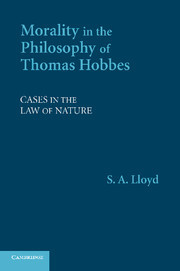Description
Morality in the Philosophy of Thomas Hobbes
Cases in the Law of Nature
Author: Lloyd S. A.
This book by S. A. Lloyd provides a radical interpretation of Hobbes' laws of nature.
Language: English
Subject for Morality in the Philosophy of Thomas Hobbes:
Approximative price 56.06 €
In Print (Delivery period: 14 days).
Add to cart
Morality in the Philosophy of Thomas Hobbes
Publication date: 03-2014
Support: Print on demand
Publication date: 03-2014
Support: Print on demand
Approximative price 107.93 €
Subject to availability at the publisher.
Add to cart
Morality in the philosophy of thomas hobbes: cases in the law of nature
Publication date: 07-2009
436 p. · 15.2x22.9 cm
Publication date: 07-2009
436 p. · 15.2x22.9 cm
Description
/li>Contents
/li>Biography
/li>
In this book, S. A. Lloyd provides a radical interpretation of Hobbes' laws of nature, revealing them to be not egoistic precepts of personal prudence but rather moral instructions for obtaining the common good. This account of Hobbes' moral philosophy stands in contrast to both divine command and rational choice interpretations. Drawing from the core notion of reciprocity, Lloyd explains Hobbes' system of 'cases in the law of nature' and situates Hobbes' moral philosophy in the broader context of his political philosophy and views on religion. Offering ingenious new arguments, Lloyd defends a reciprocity interpretation of the laws of nature through which humanity's common good is secured.
Part I. Moral Philosophy, Method and Matter: 1. Moral judgments; 2. Moral judges; Part II. From Psychology to Moral Philosophy: 3. The law of nature: definition and function; 4. A critical examination of derivations of the laws of nature; 5. The reciprocity interpretation of Hobbes' moral philosophy; Part III. From Moral Philosophy to Civil Philosophy: 6. Self-effacing natural law and the duty to submit to government; 7. Fools, hypocrites, zealots, and dupes: civic character and social stability; 8. The unity of practical wisdom.
S. A. Lloyd is Professor of Philosophy, Law, and Political Science at the University of Southern California. Lloyd is the author of Ideals as Interests in Hobbes's 'Leviathan': The Power of Mind over Matter.
© 2024 LAVOISIER S.A.S.
These books may interest you

A Companion to Hobbes 196.65 €



